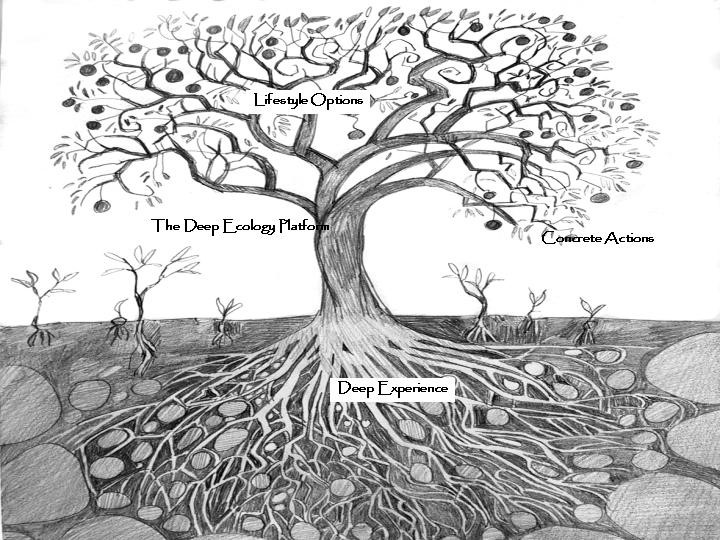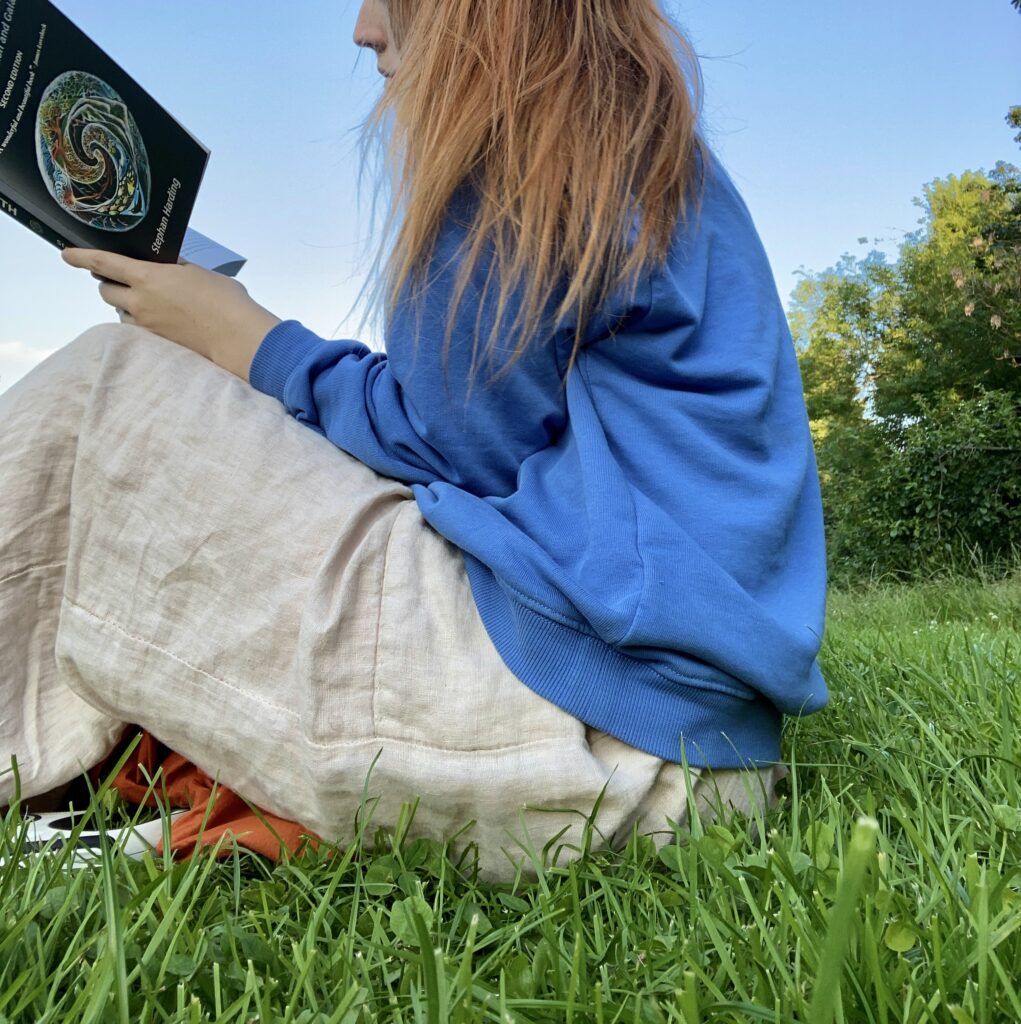Last week, I was lucky enough to attend a talk by Stephan Harding, titled ‘Deep Ecology and the Healing of the Earth’. If you aren’t aware of who this man is, he lectures at Schumacher College (somewhere I would love to study one day – perhaps for my masters!) and he also wrote the beautiful book Animate Earth. I felt so deeply inspired by his lecture that I wanted to share some of my takeaways from it.
“There is enough for everyone’s need, but not everyone’s greed”
Gandhi quoted by Stephan Harding, Deep Ecology lecture in July 2021
Stephan began his talk by explaining that deep ecology comes about through deep experience, deep questioning, and deep commitment, all illustrated by the Deep Ecology Tree of Life (pictured below). Each of these parts of deep ecology are not enough on their own; they must work in unison for someone to discover their individual ecosophy, also known as ecological harmony. Every individual’s ecosophy has to be their own – it simply cannot be the same as anyone else’s; you have to arrive at it on your own and as yourself. And this is where the work comes in. But after working through the 3 steps and discovering what deep ecology means to you personally, it is so rewarding when you find and feel connected to your unique relationship with nature.

Stephan neatly summed up that the issue we currently face is that we’re still living in the 16th century mentality that everything that has any value must be able to be measured, otherwise it is not knowledge. This is something that I have mentioned quite a few times on this blog and really struck a chord with me. The problem with generic science is that it gives us tonnes of facts, but doesn’t tell us anything about how we should be interacting with this information. And that is what is known as the ‘deep’ part – understanding how we can work in harmony with things we collect data on. Once we know this, we can commit to meaningful action that will have a positive impact on the environmental crisis. Stephan mentioned John Seed and Joanna Macy as key actors in this movement, who explain that to move forward we cannot simply know, we must honour and engage with our deepest emotions in order to radically change the reality we are living in.
The first pillar, deep experience, is allowing our ‘feeling’ side to take over our ‘thinking’ side, and to let intuition match the physical senses. This is based on the Jungian Mandala, which suggests that to truly connect with the Anima Mundi (soul of the world), or in other words Gaia, intuition, feeling, sensing, and thinking must all balance and work together rather leaning towards one or the other. The trouble is, at the moment we are definitely heavily leant towards thinking, and the belief that knowing as many facts as possible about the world means we are connected to it (this, of course, is not true). Intuition is greatly undervalued by humans, and thanks to our mechanic and materialistic culture we have been deprived of knowing the earth as a soul. Stephan read a beautiful excerpt from a book by Aldo Leopold to illustrate a perfect example of deep experience. Leopold writes about hunting wolves, and a time when his job was solely to shoot as many wolves as possible as that would increase the amount of game for humans to hunt. But his story takes a sobering turn when he remembers watching the “green fire” in a wolf’s eyes die after he shot her, and that he knew in that moment that the wolf and the mountain next to him knew something he did not. He felt the mountain as an embodiment of the earth, and spent the rest of his life close to nature, trying to learn from her. Being close to nature and truly connecting to her is essential for our souls, Harding says. But most of us do not know how to do this anymore, which is why we are destroying the planet. Nature has the capacity to teach us invaluable lessons through intuition and feeling, but we only know how to listen to facts. Stephan then quoted Arne Naess, one of his old friends: “the smaller we come to feel ourselves compared to the mountain, the nearer we come to participation in its greatness.” And that in itself is deep experience. But you don’t need to find a mountain to achieve this; deep experience could be potting a plant, or foraging, or simply listening to birdsong.
People who tend to reach these deep experiences generally believe that everything has inherent value, regardless of whether it has any perceived value to humans. Stephan says that we can’t possibly justify this, we just have to know it. We also do not have the right to reduce this value unless we are satisfying ‘vital needs’, which links back to Gandhi’s quote at the beginning of this post. For example, indigenous communities generally have strong connections to the earth, and only take from it what they need, where the western world has fallen into the trap of exploiting every resource until there is nothing left, destroying any meaningful relationship with Gaia. The diversity of life can flourish only with reduced human impact, but in order to do that we need to completely (and very quickly) change our behaviours and the way we view nature. This is where deep questioning comes into play. Looking back at the tree of life illustration, you can see that the base and trunk of the tree are deep experience and the fundamental ideologies of those who live through deep experiences mentioned above. The branches then pose the question: what am I doing with my life? What is it doing for good? What life path am I going to follow? These branches, when answered, lead to the fruit, which represents action. When the fruit is ripe and actions are fulfilled, it falls from the tree and returns to the earth to feed the soil, to provide deep experience for everyone (the basic idea is that this loop keeps going). Stephan talked here about the fact that the whole universe is part of a journey of self-realisation, which is completely out of our comprehension and beyond our understanding, but fundamental in seeing all living things as a network that we are part of, and constantly growing in.

Finally, as a result of deep questioning, commitment begins to rise in us. Questioning helps us to uncover meaning, and we then start to feel a sense of commitment to the Anima Mundi, or immense intelligence of the planet, because we know how alive it is. We know we have to commit to working with it. That is the birth of deep commitment. Then we choose a path for ourselves, which can be easier said than done and may continue for the rest of your life. Those considered ‘experts’ in this field continue to deepen their connection and experience each day, questioning each other and growing and developing their ecosophy. Stephan talks about the fact that ecosophy can grow without limit, and that deep commitment is very personal and can manifest in an infinite amount of ways. But at the root of everything, we need deep ecology to heal the earth.
My favourite quote of the whole talk was when Stephan said “Gaia is one tough bitch”. He explained that there is no malice in Gaia or the way she is reacting to our pollution with wildfire and floods. But she is alive, and if we keep pumping CO2 into her and she gets too hot, she’s going to want to get rid of us. Gaia, or the Anima Mundi, or even if you want to view it as just the planet earth – is a self-regulating organism. When a dominant species (us) starts to destroy everything in our path, that organism is going to fight back. At this point Stephan alluded to COVID-19 and our broken interactions with animals initiating it to begin with. In other words, we brought it about and are now directly experiencing Gaian feedback. “The tragedy isn’t that death and the virus exist, the tragedy is that we brought it about through our own destruction”, he says. That hit pretty hard.
I particularly loved a segment of the talk towards the end when I think Stephan was wandering into a little sidetrack; somebody asked a question about human fear of death, which is also something I’ve spoken quite a bit about on here. He clearly has a lot of feelings about this topic and I would really love to explore it more through his world view. He first quoted John Muir who believed that we have warped views on death, and that death is “stingless and as beautiful as life”. Stephan seemed to wholeheartedly believe that death is just a part of life, no different to any other part, and excitedly proclaimed “it’s going to be an experience, for sure!” He said that he has no idea what will happen, but that “everything is recycled, including the psyche – it must include the psyche! And I am delighted.” One thing I often struggle with is seeing acts of hate, especially towards the earth and how those acts dishearten or discourage me, so I asked Stephan how to remain confident that our efforts aren’t in vain. To that he replied, “any pro-gain action is never futile; no contribution is too small.” I think it’s important that everyone remembers that.
This talk was exceptionally beautiful – not that I would expect any less from this man. I feel so inspired and uplifted reflecting on what I learnt during this hour (or technically 2 now as I have thoroughly enjoyed watching it for a second time). If you would like to watch it yourself, it is now available to watch on YouTube which I have linked below. I would also recommend reading Stephan’s book Animate Earth, or listening to any of the numerous podcasts he has taken part in over the years. You will leave with such a strong sense of clarity and kinship with the world around you, and that is what is desperately needed if we are going to save Mother Earth from ecological collapse.

Leave a Reply